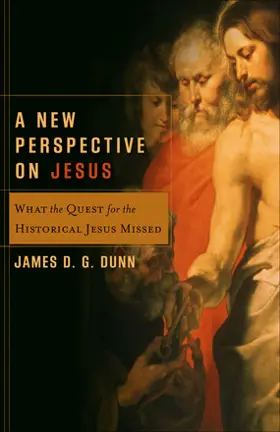

A New Perspective on Jesus: What the Quest for the Historical Jesus Missed
in Acadia Studies in Bible and Theology
Pages
136
Publisher
Baker Academic
Published
3/1/2005
ISBN-13
9780801027109
In A New Perspective on Jesus, renowned author James D. G. Dunn critiques the quest for the historical Jesus. He claims that the quest has been largely unsuccessful because it started from the wrong place, began with the wrong assumptions, and viewed the evidence from the wrong perspective.
Dunn's study offers three criticisms of questers' methods. First, Dunn contends that scholars have failed to see how the disciples' pre-Easter faith shaped the Gospel traditions. Second, he claims that a focus on literary transmission has led scholars to ignore the fact that the Gospel traditions arose in an oral culture, which shaped the way the stories of Jesus were told and passed on. Third, Dunn challenges scholars' preoccupation with finding what is distinctive about Jesus and rejecting portions of the tradition portraying Jesus as characteristically Jewish. Dunn concludes by rethinking accepted views of Synoptic relationships in light of the oral nature of the Jesus tradition.
This work offers a compelling critique of the presuppositions that inform much of contemporary Gospel study, and the alternatives Dunn proposes are sure to stimulate scholarly debate. It will interest students and scholars of the Bible, pastors and church leaders, and anyone wanting a fresh perspective on Jesus studies.
Dunn's study offers three criticisms of questers' methods. First, Dunn contends that scholars have failed to see how the disciples' pre-Easter faith shaped the Gospel traditions. Second, he claims that a focus on literary transmission has led scholars to ignore the fact that the Gospel traditions arose in an oral culture, which shaped the way the stories of Jesus were told and passed on. Third, Dunn challenges scholars' preoccupation with finding what is distinctive about Jesus and rejecting portions of the tradition portraying Jesus as characteristically Jewish. Dunn concludes by rethinking accepted views of Synoptic relationships in light of the oral nature of the Jesus tradition.
This work offers a compelling critique of the presuppositions that inform much of contemporary Gospel study, and the alternatives Dunn proposes are sure to stimulate scholarly debate. It will interest students and scholars of the Bible, pastors and church leaders, and anyone wanting a fresh perspective on Jesus studies.